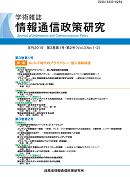Volume 7, Issue 1
Displaying 1-12 of 12 articles from this issue
- |<
- <
- 1
- >
- >|
-
2023 Volume 7 Issue 1 Pages 1-23
Published: November 20, 2023
Released on J-STAGE: December 28, 2023
Download PDF (1200K) Full view HTML -
2023 Volume 7 Issue 1 Pages 25-51
Published: November 20, 2023
Released on J-STAGE: December 28, 2023
Download PDF (2031K) Full view HTML -
2023 Volume 7 Issue 1 Pages 53-67
Published: November 20, 2023
Released on J-STAGE: December 28, 2023
Download PDF (917K) Full view HTML -
2023 Volume 7 Issue 1 Pages 69-100
Published: November 20, 2023
Released on J-STAGE: December 28, 2023
Download PDF (768K) Full view HTML -
2023 Volume 7 Issue 1 Pages 101-123
Published: November 20, 2023
Released on J-STAGE: December 28, 2023
Download PDF (1218K) Full view HTML
-
2023 Volume 7 Issue 1 Pages 125-138
Published: April 21, 2023
Released on J-STAGE: December 28, 2023
Download PDF (571K) Full view HTML -
2023 Volume 7 Issue 1 Pages 139-162
Published: April 21, 2023
Released on J-STAGE: December 28, 2023
Download PDF (687K) Full view HTML -
2023 Volume 7 Issue 1 Pages 163-183
Published: November 10, 2023
Released on J-STAGE: December 28, 2023
Download PDF (598K) Full view HTML -
2023 Volume 7 Issue 1 Pages 185-214
Published: November 10, 2023
Released on J-STAGE: December 28, 2023
Download PDF (662K) Full view HTML -
2023 Volume 7 Issue 1 Pages 215-235
Published: December 20, 2023
Released on J-STAGE: December 28, 2023
Download PDF (599K) Full view HTML
-
2023 Volume 7 Issue 1 Pages 237-258
Published: December 04, 2023
Released on J-STAGE: December 28, 2023
Download PDF (607K) Full view HTML
-
2023 Volume 7 Issue 1 Pages 259-273
Published: July 20, 2023
Released on J-STAGE: December 28, 2023
Download PDF (1470K) Full view HTML
- |<
- <
- 1
- >
- >|
